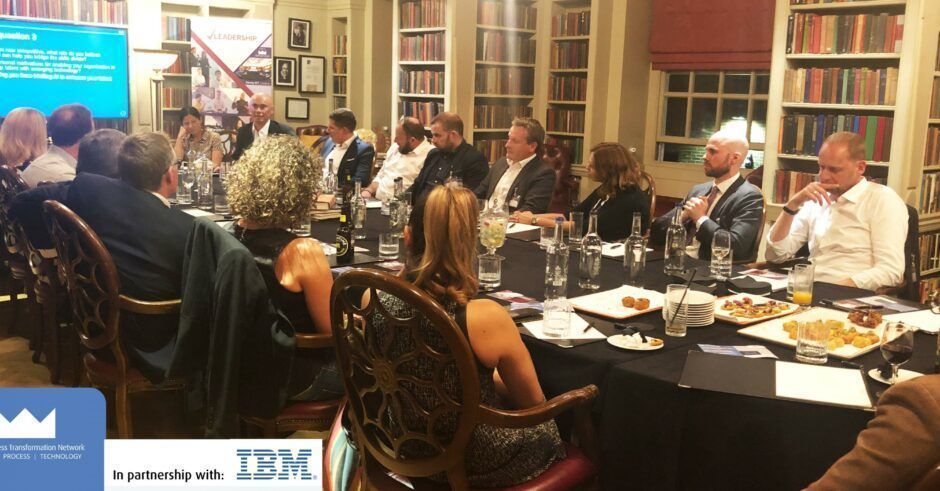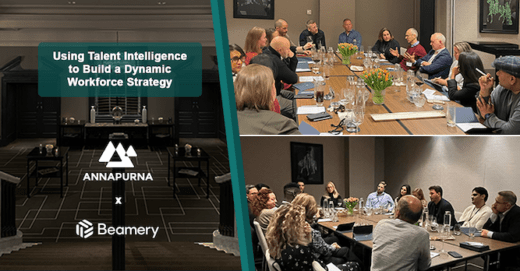The Business Transformation Network recently hosted an event on “Skills as a Currency”, in partnership with IBM, at the Bloomsbury Hotel in London, which was attended by senior HR professionals.
The conversation was open and varied, touching on a wide variety of subtopics including:
1. Given skills are the new competitive, what role do you believe technology like AI can help you bridge the skills divide?
2. What are your personal motivations for enabling your organisation to effectively develop talent with emerging technology?
3. What is preventing you from trialling AI to enhance your talent capability?
The ability to identify and provide access to the right skills at the right time is both a challenge and an opportunity for organisations looking to compete in today’s global economy. The pace of change and constant need for innovation necessitates automation and digitisation across HR and Talent – from skills acquisition to skills development, from employee productivity to employee satisfaction. A key driver behind the challenge of accelerated change is technology – but can technology also provide the solution?
Operational environments today are quite different to a decade ago, with new challenges including economic and political uncertainty, industry disruption due to technological and digital transformation and these are only the affecting factors outside of our organisations. There are many forces at play within our organisations too, which means we should be considering what we will be facing in the future, based on what we know today and we should be looking at the type of roles we want in our organisations in 5/10 years time, which is hard when we’re dealing with this rate of disruption.
As skills are the new competitive currency, what role can technology (like AI) play in helping bridge the skills divide?
With the case of technological advancements, like AI, there was a perception amongst some attendees that technology is only as good as the skills of the person using it and is only as reliable as the people who can interpret it correctly. This may have been the case for traditional analytics. However, AI can help unlock hidden talent outside an inside of your organisation and is very simple to use. The general consensus was AI is not artificially replacing the role of the Talent professional but augmenting their role. As an example, Huw Jones from the Global IBM TA team stated that AI is helping his team identify individuals with key skills 90% faster resulting in overall better quality of hire and faster time to hire.
What is preventing organisations from using AI to enhance their talent capability?
Justifying cost: The majority of HR professionals around the room agreed they require more support when writing a business case for technology such as AI.
AI knowledge. The topic of AI in itself can be rather confusing. It was too broad to tackle in the time we had together. We agreed our understanding of AI needs to improve as it is affecting a significant amount of roles. To help in this respect a number of attendees have requested follow up meetings with Nigel Guenole and the IBM Watson Talent team to understand what good AI looks like. On the other hand, there was a view that HR professionals are too hung up on the concept of AI rather than business challenges it solves, such as improved candidate experience, recruiter experience and the identification of future skills.
Data: The foundation for good AI is good data. A majority agreed their data is not sufficient enough to feed their existing systems, never mind AI. To help with this IBM recommended Watson Talent Frameworks. A comprehensive taxonomy of skills and roles curated by Watson and IBM’s team of occupational psychologists.
375 million people around the world may need to change roles and update their skills by 2030 in response to evolutions in technology and changes in business (McKinsey).
We used to talk about word processing and spreadsheet skills, now it’s cybersecurity, big data analytics, and coding. Tomorrow’s workforce needs to be equipped to navigate technologies like AI, blockchain, automation, and new innovations on the horizon. Skills, and how fast employees and companies can learn, are quickly becoming a competitive advantage—and the biggest risk. This is why 80% of executives say they are worried about the availability of key skills when it comes to competing in the future (PWC). And this is why talent development centred on skills and experiences needs to be a priority for us all.
As artificial intelligence and other new technologies help to automate tasks, support decision making and personalisation and drive new ways of working, incredible opportunities emerge for the workforce at large. This is the moment to rethink the way your talent development team operates, where and how your employees spend their time, the type of new skills and learning your team focuses on, and HR’s potential for impact on the business.
Keep your eye out for more events like this at www.thebtn.tv/events
This event write-up is exclusive to The Business Transformation Network.
IBM have provided a whitepaper on Bridging the Skills Gap following this event. You can view the whitepaper here.




